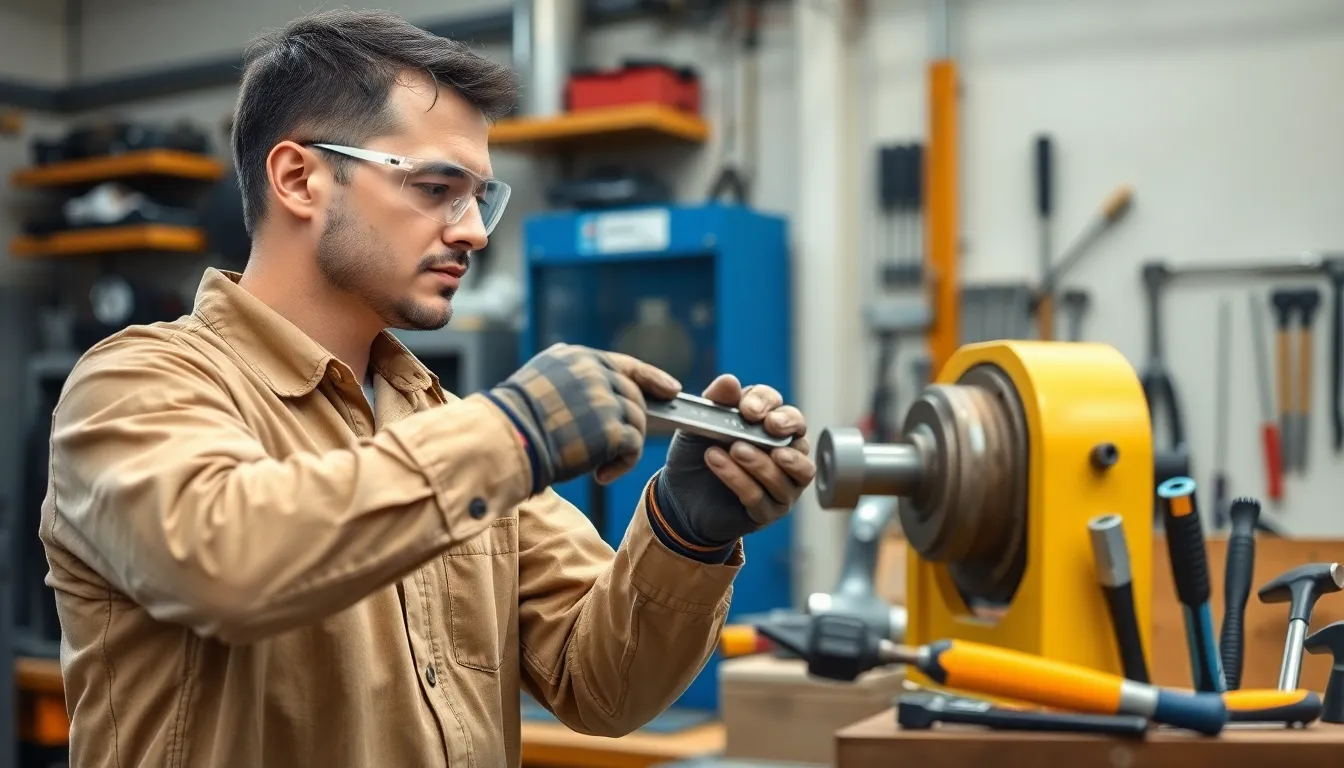In the world of mechanical workshops, tools are the unsung heroes. They’re the trusty sidekicks that transform chaos into order, turning half-baked ideas into finely tuned machines. Whether it’s a wrench that feels like an extension of one’s arm or a drill that could wake the neighbors, these tools bring dreams to life—one bolt at a time.
Table of Contents
ToggleOverview Of Mechanical Workshop Tools
Mechanical workshop tools include a wide variety of equipment designed to assist in fabrication, maintenance, and repair tasks. Common hand tools, such as wrenches, screwdrivers, pliers, and hammers, serve fundamental purposes. Each tool is tailored to perform specific functions, enhancing efficiency and safety during operations.
Power tools, including drills, saws, and grinders, offer more advanced capabilities, enabling users to tackle larger projects effectively. Their versatility often allows them to switch between different tasks, such as cutting, shaping, or assembling materials. Table saws and band saws, for example, specialize in cutting wood and metal with precision.
Measuring tools play a crucial role in ensuring accuracy in mechanical work. Calipers, micrometers, and tape measures provide essential dimensions for projects, allowing for tight tolerances that maintain quality standards. Precision measurement promotes the reliability of completed assemblies and repairs.
Specialized tools, such as torque wrenches and impact drivers, cater to specific mechanical needs. Torque wrenches enable precise tightening of fasteners, critical in automotive and aircraft applications. Impact drivers deliver more power than standard drills, facilitating easier screw driving in tough materials.
Organizational tools, like toolboxes, workbenches, and racks, contribute significantly to maintaining an efficient workspace. By keeping tools accessible, these systems enhance workflow and promote safety, reducing the likelihood of accidents. An organized shop environment often leads to improved productivity, making tasks quicker and easier to complete.
Understanding the diverse array of mechanical workshop tools enables users to select the right equipment for their projects. Each category of tools brings unique benefits, empowering individuals to create and innovate within their mechanical workshops.
Essential Hand Tools


Hand tools form the backbone of any mechanical workshop. Users rely on these tools for precision and efficiency in various tasks.
Wrenches
Wrenches play a critical role in mechanical work, designed to provide grip and turn fasteners. Users encounter several types, including adjustable wrenches, socket wrenches, and combination wrenches. Each type serves a specific purpose, enabling tasks ranging from tightening bolts to loosening nuts. Adjustable wrenches adjust to fit different sizes, making them versatile for various jobs. Socket wrenches simplify work with their interchangeable sockets, enhancing efficiency when tackling multiple fasteners. Reliable performance and durability characterize high-quality wrenches, essential for any workshop setting.
Screwdrivers
Screwdrivers offer essential functionality for securing and unscrewing screws. This tool comes in two primary types: flat-head and Phillips, addressing specific screw designs. Flat-head screwdrivers feature a simple blade, while Phillips screwdrivers possess a cross-shaped tip for better grip and torque. Various sizes and lengths accommodate different screw dimensions, making them adaptable for multiple applications. Specialized screwdrivers, such as those designed for electronics, provide precision in delicate tasks. Effective usage of screwdrivers ensures that applications remain secure and operational.
Hammers
Hammers are indispensable for driving nails and shaping materials in mechanical workshops. Various styles exist, including claw hammers and sledgehammers, each suited for particular tasks. Claw hammers excel in driving nails and removing them, making them ideal for carpentry projects. Sledgehammers deliver powerful blows for heavy-duty work, such as breaking concrete or moving large objects. Different weights and head materials influence performance, so selecting the right hammer boosts productivity. Hammers provide the necessary force to achieve desired outcomes in various mechanical tasks.
Power Tools In The Workshop
Power tools elevate the efficiency of mechanical workshops, offering users enhanced capabilities for complex tasks. Key categories include drills, saws, and sanders.
Drills
Drills are versatile tools essential for creating precise holes in various materials. Electric and cordless models provide flexibility and power for different applications. Users choose from a range of drill bits to suit specific tasks, including wood, metal, and masonry drilling. Operators can adjust speed settings to match the material and desired hole size, ensuring accuracy and consistency.
Saws
Saws come in several forms, each designed for particular cutting tasks. Circular saws excel at making straight cuts in large sheets of material. Jigsaws offer intricate cutting capabilities, perfect for curves and detailed patterns. Users rely on miter saws for clean, angled cuts in trim and framing work. Diverse blade options allow for quick adaptation to various materials and project requirements.
Sanders
Sanders refine surfaces, improving finish quality in woodworking and metalworking. Belt sanders efficiently remove material from larger areas, speeding up surface preparation. Orbital sanders provide a smooth finish, minimizing scratches or swirl marks. Random orbital sanders combine the benefits of both, delivering a fast yet even smoothing action. Various grit levels allow users to achieve desired textures and finishes on their projects.
Tool Maintenance And Safety
Maintaining tools and ensuring safety in a mechanical workshop is crucial for efficiency and effectiveness. Proper care leads to longevity and optimal performance of equipment.
Proper Cleaning Techniques
Cleaning tools regularly prevents buildup of grime and rust. Start by using a soft cloth to wipe down surfaces after each use. For stubborn dirt, a mild detergent mixed with water works well. Submerging hand tools in a solution can remove residues. Rinse thoroughly and dry completely to avoid moisture-related damage. Power tools require attention too; check manufacturer guidelines for specific cleaning recommendations. Use compressed air to blow away dust from crevices. Regular inspection after cleaning helps identify wear or damage, ensuring safe functioning.
Safety Gear Recommendations
Safety gear protects against potential hazards in the workshop. Utilizing safety glasses prevents eye injuries from flying debris. Hearing protection is essential when operating power tools, as noise can lead to long-term damage. Gloves provide grip and shield hands from sharp edges, though they shouldn’t hinder movement. Respirators protect against inhalation of harmful dust and fumes, especially when sanding or grinding. Steel-toed boots enhance foot safety against heavy falling objects. Wearing appropriate clothing also contributes to overall safety in the workspace.
Specialized Tools For Specific Tasks
Specific tasks in mechanical workshops often require specialized tools to enhance efficiency and precision. Understanding these tools enables operators to perform complex tasks with confidence.
Diagnostic Tools
Diagnostic tools play a crucial role in identifying issues within machinery. Multimeters measure voltage, current, and resistance, allowing for accurate electrical assessments. Oscilloscopes visualize electrical signals, making them essential for troubleshooting electronic components. Compression testers evaluate engine cylinder pressure, aiding in the detection of mechanical failures. Scan tools connect with vehicle systems, providing diagnostic codes and real-time data for analysis. Utilizing these tools ensures that mechanics can diagnose problems effectively and restore equipment functionality.
Fabrication Tools
Fabrication tools are essential for shaping and assembling materials in mechanical projects. Lathes rotate workpieces against cutting tools, allowing for precise shaping and finishing. Mills operate with rotating cutters to shape materials into desired forms. Plasma cutters excel in cutting through metal with high precision using ionized gas. Welding equipment joins materials through heat fusion, ensuring strong, durable connections. Each tool serves a specific purpose in the fabrication process, contributing to overall project quality and efficiency.
Mechanical workshop tools are indispensable for anyone looking to bring their creative visions to life. The right combination of hand tools power tools and specialized equipment can make all the difference in achieving precision and efficiency.
Investing in quality tools not only enhances productivity but also ensures safety and longevity in the workshop. By understanding the diverse range of tools available and their specific functions users can elevate their mechanical projects to new heights.
Ultimately the connection between a craftsman and their tools is what transforms ideas into reality fostering innovation and craftsmanship in every project.

